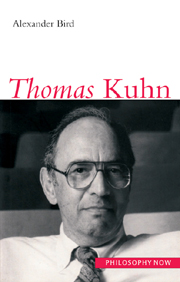1 - Kuhn's context
Summary
Revolution in the history and philosophy of science
Thanks in large part to the work of Thomas Kuhn it has become something of a commonplace among historians and sociologists of science, and even among philosophers, that in order to appreciate fully the significance of a scientific idea as much as any other historical act, we must properly understand the historical context in which it arose. Kuhn's own work concerned only ideas in science, but soon after the publication of his book The Structure of Scientific Revolutions in 1962 his model of theory-change in science was being applied to the development of thought in a wide variety of areas of academic, intellectual, and social activity. While not all extensions of Kuhn's thought are equally sound, it would be odd if the injunction to consider the historical context were applicable to science but not to the history and philosophy of science. Accordingly, in this chapter I shall sketch an outline of some of the more important developments in the philosophical, social, and historical study of science in the years preceding Kuhn's work; a brief résumé of the central claims and concepts of Kuhn's thinking will conclude the chapter. An historical introduction is particularly apt and important in Kuhn's case. One reason for this lies in the very fact of Kuhn's basic ideas having been so hugely influential. As Kuhn himself argued, a new and revolutionary idea may come to form the basis of subsequent thinking in such a way that it becomes difficult to imagine not thinking in terms of that idea, and difficult therefore to appreciate the thinking that occurred before that idea came along.
- Type
- Chapter
- Information
- Thomas Kuhn , pp. 1 - 28Publisher: Acumen PublishingPrint publication year: 2000



